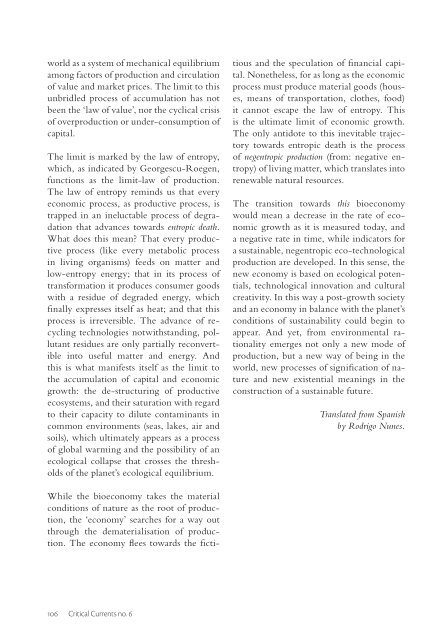Contours of Climate Justice - Dag Hammarskjöld Foundation
Contours of Climate Justice - Dag Hammarskjöld Foundation
Contours of Climate Justice - Dag Hammarskjöld Foundation
Create successful ePaper yourself
Turn your PDF publications into a flip-book with our unique Google optimized e-Paper software.
world as a system <strong>of</strong> mechanical equilibrium<br />
among factors <strong>of</strong> production and circulation<br />
<strong>of</strong> value and market prices. The limit to this<br />
unbridled process <strong>of</strong> accumulation has not<br />
been the ‘law <strong>of</strong> value’, nor the cyclical crisis<br />
<strong>of</strong> overproduction or under-consumption <strong>of</strong><br />
capital.<br />
The limit is marked by the law <strong>of</strong> entropy,<br />
which, as indicated by Georgescu-Roegen,<br />
functions as the limit-law <strong>of</strong> production.<br />
The law <strong>of</strong> entropy reminds us that every<br />
economic process, as productive process, is<br />
trapped in an ineluctable process <strong>of</strong> degradation<br />
that advances towards entropic death.<br />
What does this mean? That every productive<br />
process (like every metabolic process<br />
in living organisms) feeds on matter and<br />
low-entropy energy; that in its process <strong>of</strong><br />
transformation it produces consumer goods<br />
with a residue <strong>of</strong> degraded energy, which<br />
fi nally expresses itself as heat; and that this<br />
process is irreversible. The advance <strong>of</strong> recycling<br />
technologies notwithstanding, pollutant<br />
residues are only partially reconvertible<br />
into useful matter and energy. And<br />
this is what manifests itself as the limit to<br />
the accumulation <strong>of</strong> capital and economic<br />
growth: the de-structuring <strong>of</strong> productive<br />
ecosystems, and their saturation with regard<br />
to their capacity to dilute contaminants in<br />
common environments (seas, lakes, air and<br />
soils), which ultimately appears as a process<br />
<strong>of</strong> global warming and the possibility <strong>of</strong> an<br />
ecological collapse that crosses the thresholds<br />
<strong>of</strong> the planet’s ecological equilibrium.<br />
While the bioeconomy takes the material<br />
conditions <strong>of</strong> nature as the root <strong>of</strong> production,<br />
the ‘economy’ searches for a way out<br />
through the dematerialisation <strong>of</strong> production.<br />
The economy fl ees towards the fi cti-<br />
106 Critical Currents no. 6<br />
tious and the speculation <strong>of</strong> fi nancial capital.<br />
Nonetheless, for as long as the economic<br />
process must produce material goods (houses,<br />
means <strong>of</strong> transportation, clothes, food)<br />
it cannot escape the law <strong>of</strong> entropy. This<br />
is the ultimate limit <strong>of</strong> economic growth.<br />
The only antidote to this inevitable trajectory<br />
towards entropic death is the process<br />
<strong>of</strong> negentropic production (from: negative entropy)<br />
<strong>of</strong> living matter, which translates into<br />
renewable natural resources.<br />
The transition towards this bioeconomy<br />
would mean a decrease in the rate <strong>of</strong> economic<br />
growth as it is measured today, and<br />
a negative rate in time, while indicators for<br />
a sustainable, negentropic eco-technological<br />
production are developed. In this sense, the<br />
new economy is based on ecological potentials,<br />
technological innovation and cultural<br />
creativity. In this way a post-growth society<br />
and an economy in balance with the planet’s<br />
conditions <strong>of</strong> sustainability could begin to<br />
appear. And yet, from environmental rationality<br />
emerges not only a new mode <strong>of</strong><br />
production, but a new way <strong>of</strong> being in the<br />
world, new processes <strong>of</strong> signifi cation <strong>of</strong> nature<br />
and new existential meanings in the<br />
construction <strong>of</strong> a sustainable future.<br />
Translated from Spanish<br />
by Rodrigo Nunes.
















